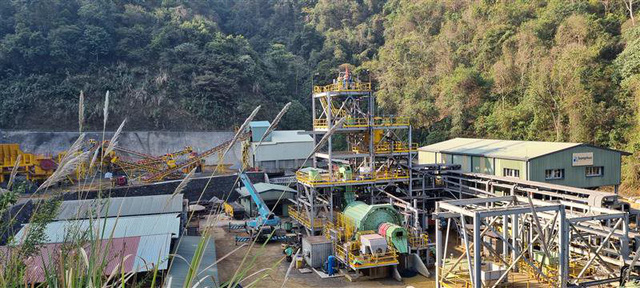
HÀ NỘI — Việt Nam has the opportunity to be at the forefront of the global movement towards the electrification of transport, so demand for nickel in Việt Nam will continue to rise, experts have said.
It is forecast that the demand for metals used to produce electric batteries, including nickel, will increase due to the rise in electric vehicles. Worldwide nickel reserves are currently estimated at around 89 million tonnes.
Nickel is one of many sought-after global resources, as is widely used in technologies such as batteries for vehicles.
Ngô Xuân Thành from Hà Nội University of Mining and Geology told baochinhphu.vn that, about 70 per cent of the world’s nickel is for stainless steel production, 17 per cent for “superalloys”, and 7 per cent for the plating industry. The rest is used in other fields such as rechargeable batteries, catalysts and other chemical agents.
The proportion of nickel-metal used in producing batteries currently accounts for about 4 per cent of the world’s nickel production.
As the amount of nickel used in batteries for electric vehicles is higher, the demand for nickel will increase significantly.
Moreover, in the context of the growing stainless steel manufacturing industry, nickel consumption is expected to continue to increase (from 2.4 million tonnes in 2019 to 2.8 million tonnes by 2025), with a growth rate of about 2.2 per cent a year.
According to Đào Công Vũ from the Institute of Mining and Metallurgy Science and Technology, Việt Nam’s total nickel reserves and resources are estimated at 3.6 million tonnes of metallic nickel concentrated mainly in the provinces of Thanh Hóa (3,067,020 tonnes), Sơn La (420,523 tonnes), and Cao Bằng (133,677 tonnes).
Most Nickel resources exist in the form of accompanying minerals in chromium ore in the Cổ Định Chromite Mine (Thanh Hóa) that there is no effective recovery solution. Nickel ores in the Sơn La and Cao Bằng areas are mainly diffused nickel-copper ores.
Vũ added that today’s most appropriate development of nickel deep-processing technology is the production of nickel salt preparations and cooperation with enterprises with source technology to produce batteries from domestic nickel ore sources.
This could help meet the electric vehicle industry’s needs for developing renewable energy and effectively promoting Việt Nam’s precious natural resources.
In 2018, the Prime Minister approved the plan to exploit gold, copper, nickel and molybdenum ores by 2025.
It is expected that mining nickel concentrate output will be 118,000 tonnes. The country would invest and put into operation two nickel factories with a total output of about 8,000 – 11,000 tonnes a year.
Blackstone Minerals, an Australian exploration and mining company, is developing three closely related projects in the north of Việt Nam. Blackstone’s vision is to be a leader in the battery revolution.
In 2019, Blackstone acquired 90 per cent of Bản Phúc Nickel Mine Co Ltd, which operates the Tả Khoa Nickel Mine in Bản Phúc Commune, Bắc Yên District, Sơn La Province.
Scott Williamson, Blackstone’s Managing Director, said: “Việt Nam has the potential to become a major player in the nickel market, and this is underpinned by the quality of the existing reserves as well as overall geological potential.”
He said that the growth rate in nickel demand for battery applications would be driven by two primary factors: the level of uptake of electric vehicles by local communities and the potential for Vietnamese electric car manufacturers to service global markets.
“It is important to consider sustainable and environmentally friendly methods of sourcing nickel, and with this regard, it would be prudent for Việt Nam to establish production lines that can recycle nickel,” he said.
“At Blackstone, we consider this part of our longer-term strategic planning. It will take time for nickel inventories (available for recycling) to build up, and we want to establish our technologies to recycle technology at this time.”
Blackstone is focused on developing an integrated upstream (mining) and downstream (refining) battery metals processing business in Việt Nam that produces nickel: cobalt: manganese (NCM) precursor products for Asia’s growing lithium-ion (Li-ion) battery industry and providing a product with “green” credentials from mine to customer.
Blackstone believes its efforts to create a business that value-adds to the products they mine – delivering this in an environmentally friendly way by using renewable hydroelectricity – will put Việt Nam at the leading edge of the green revolution.
According to Williamson, the project is currently implementing the pilot phase to bring the plant into operation by 2025. The project focuses on building “green mines,” reducing the amount of CO2 that goes into the atmosphere to achieve the goal of zero CO2 emissions in the future.
Thành from Hà Nội University of Mining and Geology said the Blackstone Minerals new technology in producing materials for batteries was a new direction.
The mainly diffused ore source in Bản Nickel mine will focus on effectively exploiting the needs for developing the electric vehicle industry and renewable energy. At the same time, he added that it was making an essential contribution to the country’s economic growth and creating jobs for locals.
With surging demand for nickel underpinned by the electric vehicle revolution, promoting the country’s natural nickel source will contribute to Việt Nam’s socio-economic development. — VnExpress News
- Reduce Hair Loss with PURA D’OR Gold Label Shampoo
- Castor Oil Has Made a “Huge” Difference With Hair and Brow Growth
- Excessive hair loss in men: Signs of illness that cannot be subjective
- Dịch Vụ SEO Website ở Los Angeles, CA: đưa trang web doanh nghiệp bạn lên top Google
- Nails Salon Sierra Madre
 VnExpress News The News Gateway of Vietnam
VnExpress News The News Gateway of Vietnam




